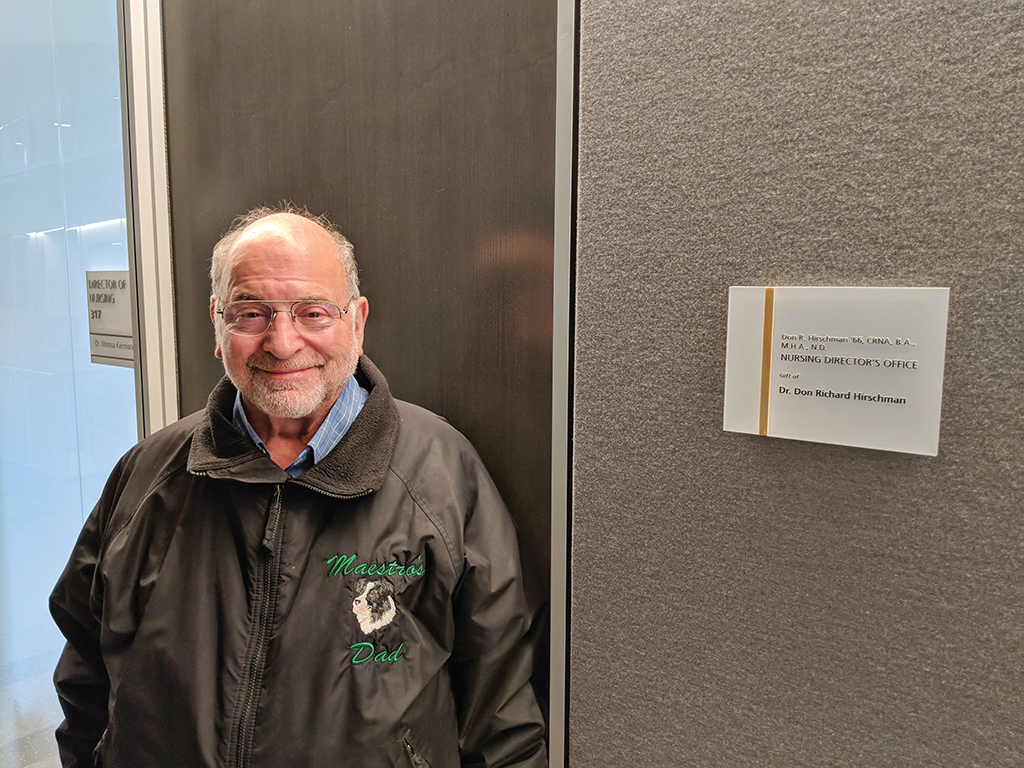Berea College was about three days ahead of the rest of the world in shutting down on-campus instruction due to the novel coronavirus pandemic in March 2020. The announcement that students were being sent home went out on a Tuesday. People scratched their heads, wondering if Berea was overreacting, but by Friday even the NCAA basketball tournament dubbed “March Madness” had been cancelled. It was not known at the time just how long things would remain shut down—people were optimistic, just a few weeks, some thought—and it was also unknown the extent to which the pandemic would affect Berea’s bottom line. Other schools have tuition to fund their efforts. Berea has friends and a market-dependent endowment.
And then, the endowment “dropped like a rock,” said Jeff Amburgey, vice president for finance. By the end of March 2020, the endowment’s market value had lost $185 million. “The sell-off in the financial markets, which was tremendous, was obviously nerve-wracking,” he added.
Berea’s operating budget was dependent upon the endowment’s return. Fortunately, the sharpest decline in market history was followed by the fastest recovery in history, and the endowment returned to health. But there were other problems. Lost revenue, unexpected expenses and helping students get home threatened the College’s reserve funds.
The first and most pressing problem belonged to students, who had to finance travel home two months earlier than usual or find a new place to live with just a few days’ notice. By the end of that month, the Coronavirus Aid, Relief, and Economic Security (CARES) Act would provide some relief, but until then the College was helping students by refunding $1.1 million in room and board costs.
The simple act of stepping up, regardless of the amount, speaks volumes about the type of community we are. It becomes clear to prospective students and families they will find a welcoming, inclusive, supportive environment at Berea.
Luke Hodson, Associate VP Admissions
International students were in a particularly tough spot. Airports and borders around the world were closed, and even if they could get home, international travel was costly. They did not have access to CARES Act funding to assist their efforts to find host families or friends willing to take them in as the pandemic raged, nor did they have much money to contribute to their keep. Thankfully, generous friends of the College made a sizeable gift to help.
Assisting students in getting home was only the beginning of the challenges the College would face over the coming year. Personal protective equipment and COVID-19 testing was needed. Plexiglass had to be installed in office buildings across campus. Essential employees merited hazard pay. Additional Zoom licenses needed to be purchased so employees could work from home. On top of these additional costs were losses in revenue. Boone Tavern was shut down or operating at half-capacity and people had stopped traveling. The Labor Program lost 140,000 hours of labor but paid the students anyway, and Student Craft, normally staffed by 100 skilled student weavers, broom makers, wood workers and ceramicists, suffered the same losses as businesses nationwide.
“As we saw this past year, the effects of the pandemic were costly,” said Dr. Chad Berry, vice president for Alumni, Communications and Philanthropy. “Like society as a whole, the College has been fighting not one crisis, but three: economic collapse for so many people, racial injustice and its tragic effects and, of course, a ravenous pandemic. All three of these challenges hit particularly hard our current and prospective students and their families. We had to respond because our mission demands it.”
Friends and alumni step up
Committed students—admitted students who did not yet attend but had plans to in the fall—may not have been at the top of mind for many people, but for Luke Hodson, associate vice president of Admissions, it was clear in April 2020 that any extra costs to the incoming class could be a burden or even a barrier to entry. He rang the alarm in an email to alumni. The pandemic was wreaking havoc on low-wealth families in America and the families of students Berea College serves. Would alumni be willing to cover the $50 deposit for incoming students?
Fifty dollars may not sound like a lot, but when Don Hirschman ’66 thought of it, he was taken back to third grade lunch. “Lunch was 25 cents,” he said, “and they raised the price to 30 cents. That might not seem like much, but I remember my mother in tears trying to figure out where that nickel was coming from.”
He remembered, too, being a Berea College student once, scrounging for cash. “We were all broke,” he said. “If you took a girl on a date, you took her to Chapel because you didn’t have to spend any money.”
Hirschman knew there were would-be Berea College families for whom $50 was a significant burden, and he resolved to help them. Nearly 100 fellow alumni joined him in the effort, raising about $21,000 to cover incoming student deposits.

“The simple act of stepping up, regardless of the amount, speaks volumes about the type of community we are,” Hodson said. “It becomes clear to prospective students and families they will find a welcoming, inclusive, supportive environment at Berea.”
All over the country, alumni and friends of the College stepped up to help in a time of need. Blair Frank, a long-time supporter, has a particular affinity for international students and offered to assist them.
“I called the school and asked how international students were dealing with the closing of the school year early. It became apparent that they needed help beyond what U.S. kids needed. I wanted to help them get through this, particularly by providing some money to alleviate the everyday expenses they would encounter that are harder to deal with at an institutional level.”
Former Berea College trustee J. Oscar McCloud ’58 was compelled by the Housing Relief Fund, set up to assist students who remained on campus over winter break, which had been extended due to an alteration of the academic calendar. Motivated by compassion and gratitude, McCloud wanted to reach out to students who could not go home to be with their families.
“For those who couldn’t go home,” he said, “Berea became their family. We were impressed by the way Berea did that. And we were also impressed by the way the president reached out to Berea alumni and Berea supporters to make them aware of what the students were going through.”
In Michigan, Diane and Bob Barnard heard about the extra expenses the College was incurring and made a large donation to help with Berea’s most urgent needs. “We hoped the pandemic would be over soon,” Diane said, “and the College would be back to its regular schedule, but we knew this experience would be a real trial for students in the meantime. We thought a special gift would lift morale, and we were glad to be able to do it.”
And in Blackey, Ky., Dean ’55 and Nina Cornett ’61, expanded their already-generous support of Berea College to help cover unexpected pandemic-related costs like personal protective equipment, travel expenses, Zoom licenses and others.
“We benefited from Berea, and we wanted to pay that debt forward to others with circumstances similar to ours. We both grew up in poor, working-class homes and conditions, and we knew from our experience with local Berea aspirants that there would almost certainly be extraordinary expenses which the students could not afford and Berea could not have budgeted or planned for.”
These are just a few examples of friends and alumni who reached out a helping hand during a challenging time. “We are so grateful that Berea alumni and friends didn’t pull back on their generosity but instead scaled up their generous support of Berea’s mission and its students,” Dr. Berry said. “There hardly has been a day go by that I haven’t been inspired and uplifted by this generosity.”
Mary Galloway, director of major giving, contributed to this article.


